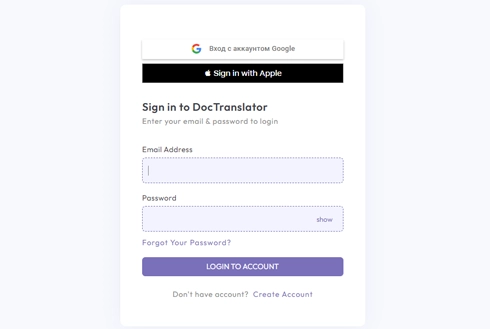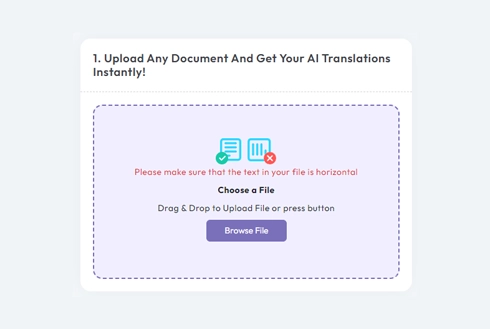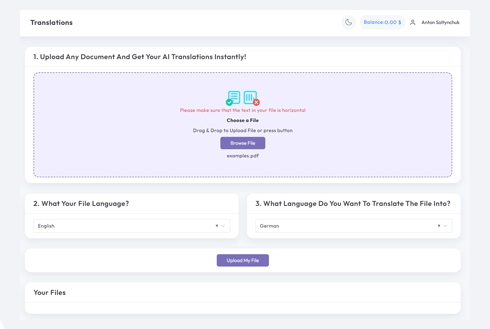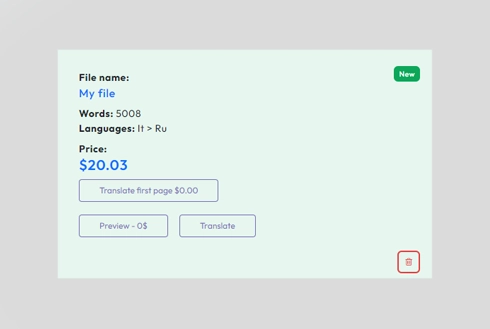
Revolutionizing Communication
Need to translate your PDF to Afrikaans?

Looking for a reliable solution to translate your PDF files into Afrikaans? Look no further! We’ve compiled a list of the top 5 options to cater to your needs:
-
DocTranslator.com: Your ultimate solution! With cutting-edge AI technology, DocTranslator.com stands out from the rest. It employs advanced Optical Character Recognition (OCR) to seamlessly translate images within PDF files while maintaining the original formatting and layout. Supporting PDF files up to a whopping 1GB in size and 5,000 pages long, DocTranslator.com is unparalleled in precision and efficiency. When it comes to accuracy, speed, and professional quality, DocTranslator.com is your go-to choice.
-
SDL Trados: A professional-grade translation software known for handling large PDF files. However, it comes with a hefty price tag and may not match the precision and formatting preservation capabilities of DocTranslator.com.
-
Adobe Acrobat: While Adobe Acrobat offers PDF translation capabilities, it falls short in comparison to DocTranslator.com. It can be costly and lacks the same level of precision and formatting retention.
-
Google Translate: A popular choice for small PDF files due to its accessibility and cost-free nature. However, it may struggle with maintaining formatting and layout integrity, unlike DocTranslator.com.
-
Microsoft Translator: Another free online tool suitable for small PDF files. However, similar to Google Translate, it may not excel in preserving formatting and layout compared to DocTranslator.com.
Choosing the right translation tool is crucial for ensuring accuracy and efficiency. Don’t settle for less when you can have the best with DocTranslator.com. Experience the difference today and witness firsthand the unmatched precision, speed, and professional quality it offers. Trust DocTranslator.com for all your PDF translation needs and elevate your translation experience to new heights.
Meet DocTranslator!
DocTranslator is a sophisticated online translation service that allows users to upload various document formats, including Word, PDF, and PowerPoint, and have them translated into different languages. Leveraging the power of the Google Translate engine, DocTranslator is specifically designed for documents and includes extra features that make it more suitable for this purpose compared to standard translation services.
Translate Any Document To Afrikaans?
Afrikaans is a West Germanic language primarily spoken in South Africa and Namibia. It evolved from the Dutch spoken by settlers in the 17th century and is now one of the eleven official languages of South Africa. Historically, Afrikaans was known as ‘Cape Dutch’ or simply as ‘Dutch’, but the term ‘Afrikaans’ was adopted in the early 20th century. This language was formally recognized in both legal and educational settings, marking its distinct branding from its Dutch origins.
Get started with DocTranslator’s seamless document translation by creating an account to access our user-friendly platform.
1. After logging in, upload your document in the “Create” section and preview it in English to ensure proper formatting.
2. Select “Continue” and provide basic file information to help us deliver accurate translations.
3. Click “Start Translation.” Sit back and relax as we efficiently translate your document into Afrikaans.
Afrikaans in the Modern World
Afrikaans, a language born out of the unique cultural melting pot of South Africa, continues to play a significant role in the modern world, both within South Africa and among Afrikaans-speaking communities around the globe. As one of South Africa’s 11 official languages, Afrikaans holds a special place in the country’s linguistic landscape, serving as a symbol of cultural identity and historical resilience.
Despite its complex history, Afrikaans has evolved into a dynamic and expressive language, enriched by diverse influences from Dutch, Malay, Portuguese, Khoisan languages, and indigenous African languages. Today, Afrikaans is spoken by millions of people in South Africa, Namibia, and diaspora communities scattered across the world.
In recent years, efforts to promote and preserve Afrikaans have expanded, driven by a renewed appreciation for the language’s cultural heritage and literary contributions. Afrikaans literature, ranging from the groundbreaking works of writers like C.J. Langenhoven and Breyten Breytenbach to contemporary voices like Marlene van Niekerk and K. Sello Duiker, continues to captivate readers with its rich storytelling and nuanced exploration of South African society.
Moreover, Afrikaans music, art, and film have gained recognition both locally and internationally, with artists and creators drawing inspiration from the language and its cultural motifs to create works that resonate with audiences worldwide. From the soulful melodies of Afrikaans folk music to the thought-provoking narratives of Afrikaans cinema, Afrikaans cultural expressions reflect the vibrancy and diversity of South Africa’s cultural landscape.
In addition to its cultural significance, Afrikaans serves as a bridge between different communities in South Africa, fostering communication and understanding across linguistic and cultural divides. While Afrikaans has historically been associated with the white Afrikaner community, it is also spoken by people of diverse backgrounds, including Coloured and black South Africans, who have contributed to its rich tapestry of expression.
In the digital age, Afrikaans language and culture have found new avenues for expression and dissemination through social media, digital content creation, and online platforms. Afrikaans-language websites, blogs, and social media accounts provide platforms for Afrikaans speakers to connect, share ideas, and engage in cultural exchange, transcending geographical boundaries and fostering a sense of global Afrikaans identity.
In conclusion, Afrikaans remains a vibrant and dynamic force in the modern world, serving as a symbol of South Africa’s rich cultural heritage and linguistic diversity. As efforts to promote and preserve Afrikaans language and culture continue to evolve, the language will undoubtedly remain an integral part of South African identity and a source of pride for generations to come.
Specific Statistics
User Engagement
DocTranslation boasts impressive user engagement metrics, with over 80% of first-time users returning for future translations. Additionally, our platform maintains a high satisfaction rate, with 95% of customers rating their experience as excellent or good. The average session duration continues to grow, reflecting the ease of use and trust our users place in the platform's quality and reliability.
Daily Conversations
DocTranslation facilitates meaningful cross-cultural communication through thousands of daily conversations. The platform processes more than 20,000 unique translation requests each day, spanning documents in multiple formats. This robust daily activity demonstrates DocTranslation’s capacity to handle high volumes efficiently, helping individuals and businesses bridge language barriers smoothly.
Training Data Size
DocTranslation's cutting-edge AI translation engine is powered by vast training data, with billions of words sourced from diverse, multilingual datasets. This extensive training data enables our system to understand nuanced language structures and idiomatic expressions, resulting in translations that are both contextually accurate and culturally sensitive. Such comprehensive training ensures that users receive consistently high-quality translations across all languages supported.
Steps required
HOW IT’S WORK

Step 1: Create a Free Account
Begin your translation journey by setting up a free account on our platform. It only takes a few moments to provide your basic information and confirm your email address. This account will serve as your personalized hub for uploading, tracking, and managing all your translation projects.

Step 2: Upload a File
After logging in, it's time to upload your document. Our system supports a wide variety of formats, including MS Word, Excel, PowerPoint, TXT, InDesign, and CSV. Simply drag and drop your file or use the “Browse” option to select the file from your device.

Step 3: Select the Original and Target Languages
Specify the language in which your original document is written. Then, choose the target language to which you want the document translated. With our extensive list of supported languages, you'll find the perfect match for your audience, whether it's for a business proposal or a creative campaign.

Step 4: Click the Translate Button and Download
Once you've set your language preferences, click the “Upload” button to begin processing. Sit back and relax while our advanced translation system works on your file, maintaining the original layout and style while delivering an accurate translation.
Get translation for file now!
Sign up today and discover the power of DocTranslator and what it can do for your financial institution.



